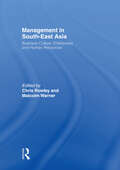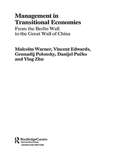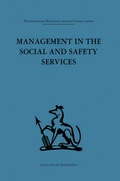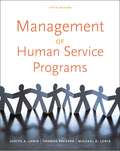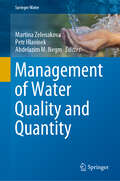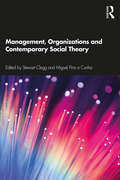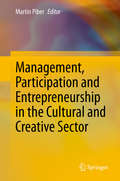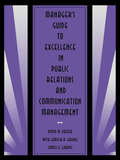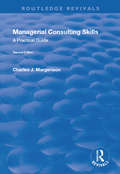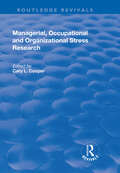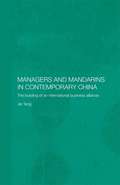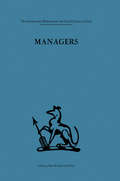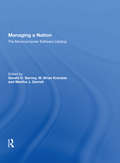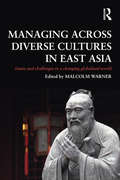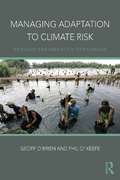- Table View
- List View
Management in South-East Asia: Business Culture, Enterprises and Human Resources
by Malcolm Warner Chris RowleyThis edited volume deals with Management in South-East Asia. It widely agreed that this is a region of growing importance economically in today’s globalized world. This area contains a diverse range of dynamic economies, ranging from the ‘highly developed’ through to the ‘newly emerging’, each competing in a different manner and with different characteristics. This book specifically focuses on current and future developments in areas such as Business Culture, Enterprises and Human Resources. It covers a range of topics, industries, size of firms and countries (Malaysia, Singapore, Thailand, Vietnam, three of which are capitalist economies, with the latter a transitional communist one). These locations also comprehend a variety of business cultures, with a variety of religious values, ranging from Buddhist to Islamic, and ethnic identities. The approach taken is inter-disciplinary and most of the contributions are by locally-based authors who are very well qualified to write about their chosen country-setting. The experts contributing include those specialized in banking, business management, economics, finance, sociology, psychology and so on, all based in business schools and universities, encompassing a good number of national origins. This book was previously published as a special issue of the Asian Pacific Business Review.
Management in Transitional Economies: From the Berlin Wall to the Great Wall of China
by Ying Zhu Malcolm Warner Vincent Edwards Gennadij Polonsky Danijel PuckoBased on extensive research, this comparative study examines the past, present and future of management in the transitional economies of East and Central Europe, Russia, the People's Republic of China, and Vietnam. It discusses the nature of the transition process, identifying different transition paths, highlighting common features and outlining useful theoretical approaches. Each chapter covers a wide range of aspects of management in the countries covered, including details of the historical and cultural background, the transition process, and both external and internal factors, and the macro and micro situation. Its multidisciplinary approach, makes this book suitable for both a practitioner and an academic readership
Management in the Social and Safety Services
by W D Reekie Norman C HuntTavistock Press was established as a co-operative venture between the Tavistock Institute and Routledge & Kegan Paul (RKP) in the 1950s to produce a series of major contributions across the social sciences. This volume is part of a 2001 reissue of a selection of those important works which have since gone out of print, or are difficult to locate. Published by Routledge, 112 volumes in total are being brought together under the name The International Behavioural and Social Sciences Library: Classics from the Tavistock Press. Reproduced here in facsimile, this volume was originally published in 1974 and is available individually. The collection is also available in a number of themed mini-sets of between 5 and 13 volumes, or as a complete collection.
Management of Healthcare (Routledge Revivals)
by Rosemary StewartPublished in 1998, this collection of essays on the management of healthcare look at topics such as: income, distribution and life expectancy; internal market reform of the National Health Service; the changing nature of the medical profession; and doctors as managers.
Management of Human Service Programs
by Judith A. Lewis Thomas R. Packard Michael D. LewisPractical and easy to use, this human services text provides important guidelines for working within agencies. The authors address important topics germane to management and administration, including evidence-based and empirically based practice, as well as challenges of management, environments of human service agencies, program design, organizational theory and design, human resources, supervisory relationships, finances, information systems, program evaluation, organizational change, leadership, and achieving and maintaining organizational excellence. To help you view issues in action, the authors have included a case example in each chapter, along with reflection questions to help you reflect on how you would handle the scenario.
Management of Regeneration: Choices, Challenges and Dilemmas
by John Diamond Joyce LiddleStemming from a need to understand strategic processes, examine current practices, and identify the needs of regeneration management professionals, this book cites current regeneration management practice within a framework which critically examines the theoretical models developed over the past twenty years. It features illustrative case studies, learning objectives, key themes boxes, and review and reflection segments, and explains strategic processes and new forms of local, sub-regional and regional management. It also investigates the development and extension of the roles of regeneration managers (which increasingly illustrate the uneven and contradictory nature of this subject), and raises important issues regarding how such individuals are supported and developed. This book: examines current initiatives in order to present good practice provides practitioners and students with an understanding of the choices, challenges and dilemmas faced by regeneration managers focuses on the themes of partnership, capacity building and community engagement, participation and sustainability has an accompanying web page featuring downloadable PowerPoint slides and test blanks. A valuable resource for public sector managers, and urban management professionals, this book synthesises strategic literature and applies it within a changing local, sub regional and regional governance system. Providing a clear framework within which new models of strategy and implementation can be found, it presents a balanced approach between existing theory and practical case material.
Management of Water Quality and Quantity (Springer Water)
by Petr Hlavínek Abdelazim M. Negm Martina ZelenakovaThis book focuses on water pollution, water management and water structures. Presenting contributions on water quality and quantity issues from the engineering point of view, it discusses a variety of issues, from storm water management in urban areas and water quantity, to hydraulic structures, hydrodynamic modeling and flood protection. The book also provides state-of-the-art insights, which that can be used to effectively solve a variety of problems in integrated water resources management, and introduces the latest research advances. Edited and authored by pioneers in the field who have been at the forefront of water management development in the Czech Republic, this book is a valuable resource for environmental professionals, including scientists and policymakers, interested in water-related issues both in the Czech Republic and elsewhere.
Management sozialwirtschaftlicher Organisationen: Eine Einführung (Basiswissen Sozialwirtschaft und Sozialmanagement)
by Klaus GrunwaldZiel des Lehrbuchs ist es, in zentrale Begriffe und Themen des Managements sozialwirtschaftlicher Organisationen einzuführen. Im Zentrum stehen Herausforderungen des Managements sozialer Einrichtungen und ihre theoretische Fundierung. Thematisiert werden auf der Basis begrifflicher Klärungen weiterhin spezifische Konzepte wie Entwicklungsorientiertes Management, Systemisches und Dilemmatamanagement. Abgerundet wird der Band mit Grundlagen der Personalführung und der Auseinandersetzung mit der Rolle der Führungskraft in sozialwirtschaftlichen Organisationen.
Management, Organizations and Contemporary Social Theory
by Stewart Clegg Miguel Pina CunhaSocial theorists speculate about large-scale social questions, asking of any phenomenon, how is it possible? This book addresses how various social theories contribute key insights into the nature of organizations and management. The cast of characters to be found in this book have had a transcendental impact, including on the practices of the management and organization disciplines. For students, however, engaging with social theory in a conversation that is much broader and potentially richer than those that may have been previously encountered is not at first easy. The question is where to begin: this book provides answers. Drawing on research from international contributors, this valuable textbook is an essential resource for students and introduces key social theories and theorists making them accessible to a management audience. The chapters include objectives and end-of-chapter reflective questions, as well as a glossary for readers grappling with new terms.
Management, Participation and Entrepreneurship in the Cultural and Creative Sector
by Martin PiberThis book elucidates and maps the societal impact of experience and heritage, participation, and entrepreneurship in the cultural sector. The contributions address and explore the relevance of culture, cultural entities, and heritage as collective memories and reservoirs of experience for other social systems, change and societal innovators like entrepreneurs. Insofar, cultural activities can be understood as a bridge between past experiences and future challenges. The first key focus is the participation of people in various contexts, initiatives, and projects. Such participation unleashes creativity and connects different societal layers – culture, economy, and innovation. Accordingly, a second focus is the entrepreneurial efforts and ideas that originate within arts and culture. Readers will find critical empirical and theoretical studies that challenge the current understandings of the cultural sector from different theoretical perspectives and with different methodological approaches. A variety of topics are explored within the thematic areas of cultural heritage, managerial practices, participation, and cultural entrepreneurship, as well as their inter-relations. Ultimately the aim is to provide the reader with a better understanding of the sometimes conflicting, sometimes mutually fertilizing areas of the arts, culture, business, management, and innovation. The book will be of interest to scholars, students, professionals, and policymakers.
Management, Social Work and Change (Routledge Revivals)
by Elizabeth Harlow John LawlerThis title was first published in 2000: This text focuses on developments in social work and its management. In doing so, it is of necessity multi-disciplinary: research and literature from the fields of management, organization and social policy, as well as social work, are drawn upon. The major theme of the book is change, which, paradoxically, appears to be the major constant. Change is everywhere and living with change is part of the "modern condition". As the various transformations of social work are articulated, their influence becomes apparent. Each process will constitute a theme around which the content of this book is introduced. Although these processes are interdependent, each will be dealt with in turn.
Manager Empowerment in China: Political Implications of Rural Industrialisation in the Reform Era (Routledge Studies on China in Transition #Vol. 14)
by Ray YepInstitutional changes in rural China caused by the economic reforms of the post-Mao era have led to a new pattern of state-society interaction in the rural polity. Central to this is the spectacular rise of a group of managerial elites. Contrary to economic predictors, this has been accompanied by the development of an interdependence between these managers and the state. This book provides an analysis of the new state-society relationship and demonstrates the complexity and fluidity involved in institutional development and market transformation.
Manager's Guide to Excellence in Public Relations and Communication Management (Routledge Communication Series)
by James E. Grunig Larissa A. Grunig David M. DozierThis book reports findings of a three-nation study of public relations and communication management sponsored by the International Association of Business Communicators (IABC) Research Foundation. The Excellence Study provides communication managers and public relations practitioners with information critical to their own professional growth, and supplies organizations with tools that help them communicate more effectively and build beneficial relations with key publics. Communication excellence is a powerful idea of sweeping scope that applies to all organizations -- large or small -- that need to communicate effectively with publics on whom the organization's survival and growth depend. The essential elements of excellent communication are the same for corporations, not-for-profit organizations, government agencies, and professional/trade associations. And they are applicable on a global basis. The study identifies three spheres of communication excellence. These spheres consider the overall function and role of communication in organizations, and define the organization of this book. They are: * the core or inner sphere of communication excellence -- the knowledge base of the communication department, * the shared expectations of top communicators and senior managers about the function and role of communication, and * the organization's culture -- the larger context that either nurtures or impedes communication excellence. This text also examines communication excellence as demonstrated in specific programs developed for specific publics.
Managerial Consulting Skills: A Practical Guide (Routledge Revivals)
by Charles J. MargerisonThis title was first published in 2001. The advisory role in organizations is more important today than it has ever been. To perform effectively, managers and professionals need the skills of the consultant. This manual is designed to provide practical help for all advisers, whether working within or outside the organization. It covers every aspect of the process, from interpersonal skills to organizational context, from planning to follow-up. This second edition reflects developments which have taken place since the publication of the first edition and now includes ten chapters on the impact that action learning has on change processes and the way that the Web is likely to influence consulting. Each chapter concludes with guidelines summarizing the content, and questions designed to help the reader to apply the material to his or her own activities. Real-life cases from Dr Margerison's own experience are included, as well as examples drawn from the work of many well-known consultants.
Managerial Prerogative and the Question of Control (Routledge Revivals)
by John StoreyIn both Marxist and non-Marxist scholarship there has been a remarkable neglect of the managerial control of labour. John Storey’s analysis of the modern labour process shows that managerial control is in fact more precarious than has been so far recorded. This book, first published in 1983, reassesses the Braverman theory of the inexorable degradation of work, and demonstrates the need to go beyond not only Braverman but also most of the ensuing attempts to complement or repair his underlying thesis. The book will be of interest to students of the social sciences.
Managerial Work (Routledge Revivals)
by Rosemary StewartFirst published in 1998, readers of this volume will get a good overview of research into managerial work. They will learn about: what the researchers have studied; what methods have been used and the criticisms of the limitations of individual methods; the different concepts that have been developed; what has been learnt about managerial work and behaviour from these studies over the years; how this field of study has developed; the main criticisms made of the research; suggestions for future research and future developments. Studies of managerial work have a long history: the first major work was by Sune Carlson in Sweden in 1951 and studies have continued to the present day, mainly in the USA and the UK. The early studies sought to find out what managers actually did, as distinct from the generalized theories of the nature of managerial work. They were part of the new interest of social scientists in finding out what actually happened in organizations in opposition to the general theories that prevailed then. Articles cannot give a complete picture of the field studies that have been such a notable feature of this branch of research, because Carlson’s study, like many of the later ones, was published only as a book. However, they provide all the information that students and researchers need to understand the aim, methods and approaches used by researchers so far and a good guide to the varied possibilities for developing this area of study.
Managerial, Occupational and Organizational Stress Research
by Manchester School of ManagementsThis title was first published in 2001. A discussion of managerial, occupational and organizational stress research. The volume is in seven parts. The first part explores the theoretical or conceptual frameworks in occupational and organizational stress that have developed out of empirical work and work with others in different countries. The second part provides the reader with reviews of literature on different topics in the field of workplace stress. Part Three highlights a range of studies undertaken by UMIST and their collaborating colleagues in different institutions. The research that highlights issues and problems of current relevance is found in the fourth part, while the methodological studies involving instrument development, refining of existing measures, and more, is found in Part Five. The studies linking stress and health follows on from this, and the new area of investigation, evaluating stress management interventions, concludes this survey of research in this field.
Managerial, Occupational and Organizational Stress Research (Routledge Revivals)
by 0 Manchester School of Managements,This title was first published in 2001. A discussion of managerial, occupational and organizational stress research. The volume is in seven parts. The first part explores the theoretical or conceptual frameworks in occupational and organizational stress that have developed out of empirical work and work with others in different countries. The second part provides the reader with reviews of literature on different topics in the field of workplace stress. Part Three highlights a range of studies undertaken by UMIST and their collaborating colleagues in different institutions. The research that highlights issues and problems of current relevance is found in the fourth part, while the methodological studies involving instrument development, refining of existing measures, and more, is found in Part Five. The studies linking stress and health follows on from this, and the new area of investigation, evaluating stress management interventions, concludes this survey of research in this field.
Managers and Management in Vietnam: 25 Years of Economic Renovation (Doi moi) (Routledge Studies in the Growth Economies of Asia)
by Vincent Edwards Anh PhanThis book presents a comprehensive overview of managers and management in Vietnam, based on extensive original research, including interviews with a large number of managers in Vietnam. It shows how management in Vietnam is best understood from the perspective of Vietnamese managers themselves, rather than in terms of Western or Asian models of management. It discusses the range of enterprises in the Vietnamese economy, which, until 1986, was dominated by large state-owned enterprises and Soviet-style central economic planning, and where there is now a much greater variety, with a mix of privatised state-owned enterprises, foreign-owned companies, joint ventures and a very large number of relatively small private companies, all operating in a social market economy where Party ideology emphasises a balance between economic growth and workers’ rights. The book demonstrates how the tensions arising from this economic landscape are reflected in the views and actions of managers as they balance economic and social goals in their work, and how their activities are constrained further by the enduring influence of local culture which is not always amenable to imported ideas and methods. As many managers have worked in different kinds of companies, the book also reveals a great deal about management in different contexts and also about how companies have changed as the reform process has evolved.
Managers and Mandarins in Contemporary China: The Building of an International Business (Routledge Studies on the Chinese Economy #Vol. 16)
by Jie TangThis study explores the question as to whether the way in which Chinese management handles conflict is fundamentally different from elsewhere or much the same. It does so by examining in detail an international joint venture construction project, where managers rooted in contrasting business systems were brought together, and by showing how the project progressed over time, how various conflict situations arose, and how they were handled. In addition, the book provides an in-depth account of the inner workings of the Chinese business world, touching on issues such as: differing international standards and management procedures the peculiarities of Chinese red tape paternalism and nepotism the limits on contract in contemporary China the involvement of local officials. Of interest to scholars and managers alike, this study benefits from the unparalleled access the author secured to all the parties involved. Working alongside managers as a participant observer, Jie Tang uses the fine detail of ethnography to convey a vivid impression of the lives of managers in China today and the forces with which they have to contend.
Managers: Personality & performance
by Kenn RogersTavistock Press was established as a co-operative venture between the Tavistock Institute and Routledge & Kegan Paul (RKP) in the 1950s to produce a series of major contributions across the social sciences. This volume is part of a 2001 reissue of a selection of those important works which have since gone out of print, or are difficult to locate. Published by Routledge, 112 volumes in total are being brought together under the name The International Behavioural and Social Sciences Library: Classics from the Tavistock Press. Reproduced here in facsimile, this volume was originally published in 1963 and is available individually. The collection is also available in a number of themed mini-sets of between 5 and 13 volumes, or as a complete collection.
Managing A Nation: The Microcomputer Software Catalog--second Edition
by Richard Harwood David Holland John D. Sterman James W. Mercer Margee M. Ensign Martha J. Garrett Gerald O. Barney W. Brian Kreutzer Stephen J. Binhak Jennie M. Hommel J. G. Krishnayya Lynn A. Kurtz Kenneth L. Kvamme Norman Meyers Peter J. Opdahl Ann Elise Schneider Alan M. Thorndike Daniel Tunstall Sheryl WilkinsThis book is a collection of reviews of microcomputer programs of special relevance to those people around the world who are responsible for the management of the current and future affairs and business of their countries.
Managing AIDS: Organizational Responses in Seven European Countries (Routledge Revivals)
by Bernd Marin Patrick KenisFirst published in 1997, this volume examines how, in the last 15 years, HIV/AIDS has become a challenge for public health, public policy and research. Reducing further HIV transmissions as well reducing the personal and social impact of HIV/AIDS requires a wide range of activities developed by a wide range of organizations – the supply of which varies widely between countries, regions and social groups. The book describes the programmes which seem particularly effective in dealing with HIB/AIDS and sets out to explain the disparities in their distribution. It documents and tries to understand both similarities as well as the variety of national approaches taken to cope with HIV/AIDS in a number of European countries. On the basis of the welfare-mix model, six country studies and an introductory chapter draw particular attention to the different mixes of public policies and private non-profit, community-based activities; the functional mixes between different types of services in the areas of prevention, care, research, control and monitoring, interest representation, fund-raising. The mixes between specialized, so-called "exclusive" HIV/AIDS service organizations and services made available by general, comprehensive, or so-called "inclusive" institutions which provide AIDS-specific programmes among other activities will also be elaborated. The whole range of HIV/AIDS activities, from professional services to self-help, is analysed in a comparative perspective. The book is based on data from the European Centre / WHO Collaborative Study Managing AIDS. It is a comparative policy study focused on the role of non-profit organizations in public health and welfare policy, covering several thousands of organizations and HIV/AIDS programmes in six European countries. Unexpected similarities and divergence in AIDS service organizations across Europe were found. The sheer multitude of programmes offered called a surprise to experts in the field, as did remaining conspicuous blank spots or deficiencies in services. Degrees of AIDS policy coherence, prevention efforts, service density and quality, self-help and professionalization, medicalization vs. social integration of HIV/AIDS programmes, sectoral specialization and institutionalization all vary tremendously, as do the efficiency and effectiveness of organizational responses to HIV/AIDS. Interestingly, variations in the supply of activities can hardly be explained by epidemiological patterns and corresponding demand and needs. AIDS management requires long-term institutional strategies and information which cannot be provided by epidemiological or behavioural analysis alone. An effective struggle against HIV/AIDS also requires institution-building, inter-organizational development and policy-field analysis.
Managing Across Diverse Cultures in East Asia: Issues and challenges in a changing globalized world
by Malcolm WarnerWhy ‘Managing across diverse cultures in East Asia’? We re-examine in this book the link between culture and management across the region vis a vis the new economic, political and social landscape that has appeared over the last decade. We accordingly present a set of chapters on East Asian cultures, economies, societies and their management across the board, focusing on countries such as China, Japan, South Korea, as well as the Overseas Chinese enclaves of Hong Kong SAR, Macao and Taiwan. The contributors to this edited book are all specialists in their respective fields; they hail from a variety of universities and business schools across the world, located in a wide range of countries in the East and in the West. The chapters, we believe, reflect a balance between the past and present, theory and practice, as well as the general and the particular. 'East Asia could not be more important. Malcolm Warner could not be more insightful. Reading Managing Across Diverse Cultures in East Asia will allow you to gain a profound understanding of the cultural complexity in this dynamic region of the world.' - Nancy J. Adler, McGill University, Montreal 'We all need to understand more about management in East Asia, and to learn from it. Managing Across Diverse Cultures in East Asia has contributions from international experts who provide significant insights into the cultures of the most dynamic region in the world today. This book is a landmark publication.' - John Child, University of Birmingham 'This edited volume, with contributions by significant scholars from around the globe, provides a timely and penetrating review of management issues across East Asia, a region that rivals Europe and North American in economic significance and is still ascending. It is a must read for anyone who is interested in international management.' - Kwok Leung, City University of Hong Kong 'Helping a new generation of readers interested in this important region to make better sense, Managing Across Diverse Cultures in East Asia is destined to become a new classic. I expect this well-researched book to be widely read, cited, and debated in the years to come.' - Mike W Peng, University of Texas at Dallas 'Having had such unexpected disasters as earthquakes, floods and financial crises in recent years, we are increasingly dependent on people-management. Development of human resources, in turn, requires region-specific and organization-specific strategies. The present volume edited by Malcolm Warner points the reader to the secret of success in high-performing economies and firms in East Asia.' - Yoko Sano, Kaetsu University, Tokyo
Managing Adaptation to Climate Risk: Beyond Fragmented Responses
by Geoff O'Brien Phil O'KeefeClimate change is the single largest threat to the attainment of the Millennium Development Goals (MDGs) and sustainable development. Addressing climate risk is a challenge for all. This book calls for greater collaboration between climate communities and disaster development communities. In discussing this, the book will evaluate the approaches used by each community to reduce the adverse effects of climate change. One area that offers some promise for bringing together these communities is through the concept of resilience. This term is increasingly used in each community to describe a process that embeds capacity to respond to and cope with disruptive events. This emphasizes an approach that is more focused on pre-event planning and using strategies to build resilience to hazards in an adaptation framework. The book will conclude by evaluating the scope for a holistic approach where these communities can effectively contribute to building communities that are resilient to climate driven risks.
